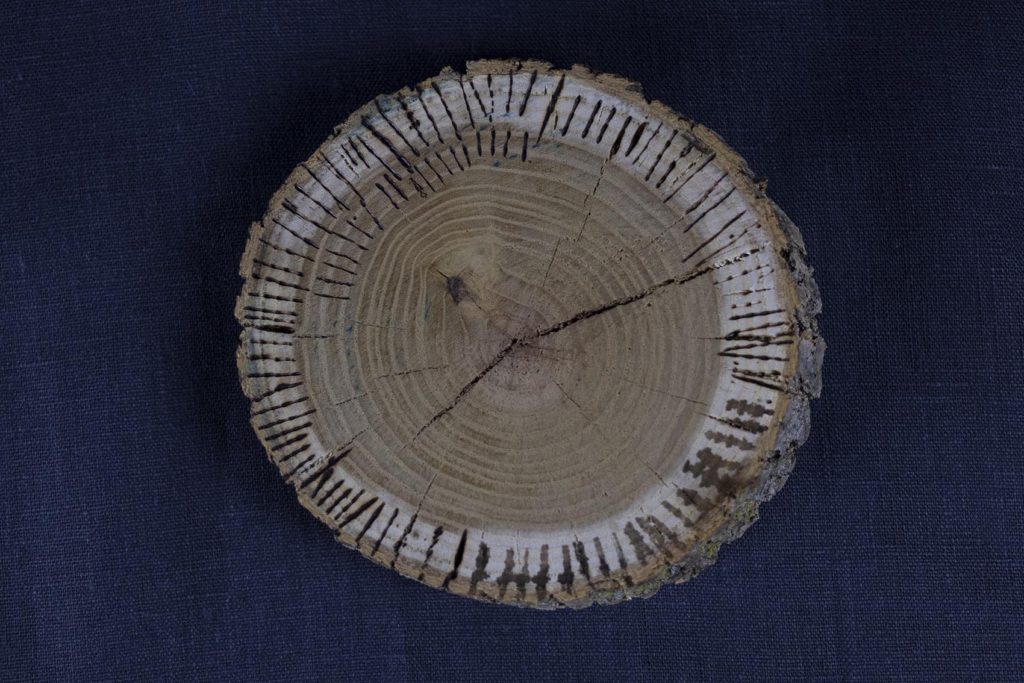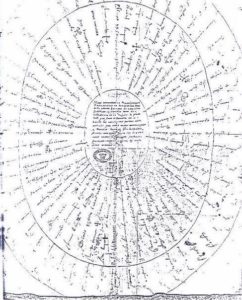
When we first invited locals to burn lines into a slice from the Log of Unknown Origin to commemorate their lost trees, we didn’t elaborate on the form they should take. Even still, a pattern emerged immediately: short tally marks drawn perpendicular to the growth rings. My first thought: we created a round robin.
Today, “round robin” means a tournament in which players compete one by one against every other player, but in 17th century-France, rond ruban (“round ribbon” in English) meant a document or petition with multiple signatures written in a circle, like this one dated 1621, seeking permission for Walloon and French Huguenot families to settle in Virginia:

A round robin renders no one responsible because it renders everyone responsible. Say you wanted to petition the king, and you also wanted to keep your head. The rond ruban protected you and everyone else.
What does it mean that the frontispieces to our codex are a round robin? Maybe we’ve internalized propaganda by big polluters–all those ads prosecuting our personal choices– driving an SUV or a sucking soda through a plastic straw. We have decentralized climate justice, exactly as Big Oil & Big Plastic & Big Fashion hoped we would, each and every one of us just another name in the round robin, on equal footing with Exxon & Shell & Dupont & Shein & Forever 21.
Never mind that “100 companies are responsible for 71% of global emissions” — meaning, this should be simple, right? And yet it’s not.
Buried in the 2017 Carbon Majors Report, polluters find their alibi:
Direct operational emissions (Scope 16 ) and emissions from the use of sold products (Scope 3: Category 11) are attributed to the extraction and production of oil, gas, and coal. Scope 1 emissions arise from the self-consumption of fuel, flaring, and venting or fugitive releases of methane.
Scope 3 emissions account for 90% of total company emissions and result from the downstream combustion of coal, oil, and gas for energy purposes. A small fraction of fossil fuel production is used in non-energy applications which sequester carbon.
A big chunk of scope 3 is us: commuting to work in cars, tossing appliances in the trash instead of fixing them when they break, ordering cheap clothes on Shein that wind up in the donation bin (or the trash) in a season or two.
Many of us do at least some of these things. But is it always a choice?
Where I live, large portions of the city have no sidewalks, no crosswalks, little pedestrian infrastructure at all. Buses stop running in early evening and never run on Sundays (I guess people magically don’t need to go places on Sunday). Transit stops are few & far between, with many missing benches and shelters. Many are not ADA-compliant.
In Cedar Rapids, our infrastructure isn’t built for anything but driving. If you want to get to work, shop for groceries, eat out, visit friends — anything, really — you’re probably climbing in a car. Every once in awhile, someone starts a thread on NextDoor griping about pedestrians & wheelchair users on the shoulder or in the street, but when you remind them of this:

… they get angry.
When locals get the choice to go greener — a master sidewalk plan, light rail on the old CRANDIC rail line between Cedar Rapids and Iowa City, a city streetcar — they reject it. Nobody will use it, they claim. Nobody walks anywhere. Nobody wants a train disrupting traffic flow on the interstate.
Here, we really are guilty. Or are we?
After all, we have forced the responsibility of sidewalks — and only sidewalks, not roads — on individual homeowners: individuals pay for paving & repairs; individuals shovel snow in winter. When we place a financial, physical, and temporal burden on individuals, of course they will resent it.
And why would anyone trust transit expansion when our current system is abysmal?
What about throwing out busted appliances? The fact is, manufacturers design them for failure — and make them impossible to repair. Dumping them in the landfill is built into their lifecycle. Not a choice. (Activists are fighting for the right to repair.)
Those cheap polyester dresses on Shein & Forever 21 that wind up in the landfill (even if you donate them)? Lots of people make so little money, they can’t budget for anything more sustainable. If you want people to buy organic cottons and linens, you have to pay them enough to do it.
Our frontispieces were meant to be a memorial, but now I see them as a petition to the trees themselves, whose rings hold the records of humanity’s crimes — the chemical signatures of our pollution stored in them a round robin of sorts, too, one we have been signing all along.
